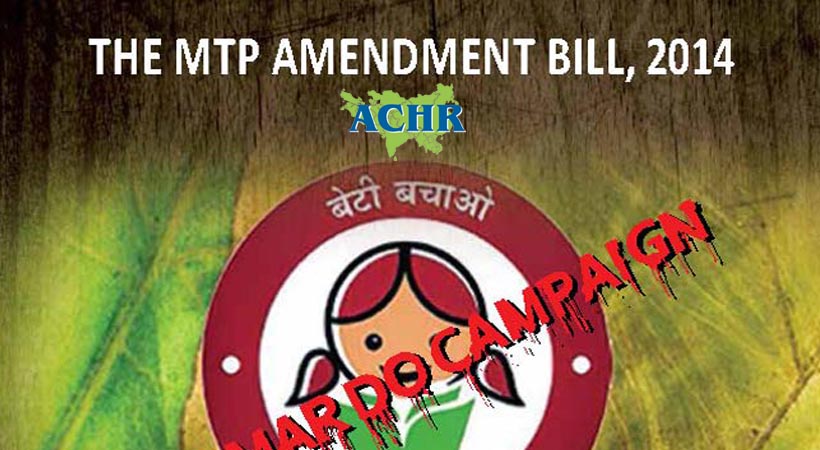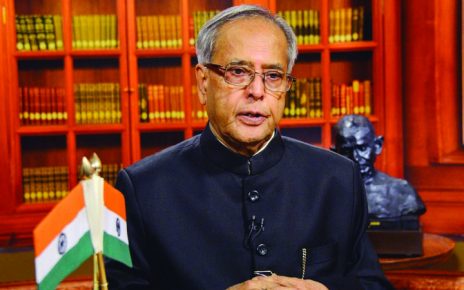In its pursuit of introducing India’s civilisational values in the field of medicine, the National Democratic Alliance (NDA) led Government of India has proposed further amendments to the Medical Termination of Pregnancy Act of 1971 in October 2014 to allow AYUSH practitioners (excluding Yoga and Naturopathy), homeopaths, nurses and auxiliary nurse midwife (ANM) to conduct abortions and also increase the gestation period for abortion from current 20 weeks to 24 weeks.
This effectively means the Government of India launching Beti Mar Do (kill daughters) Campaign.
1. Increasing more risks to life during pregnancy
As many as 50,000 pregnant women die every year in India constituting 17% of the total maternal deaths in the world. India’s MMR or maternal mortality ratio (number of maternal deaths per 1,00,000 live child births) was 178 in 2010-12 which is worse than poorer countries such as Myanmar and Nepal, and the same as Laos and Papua New Guinea.
There is no data available on the numbers of unsafe abortions. On 1 August 2014, then Union Minister of Health and Family Welfare, Dr. Harsh Vardhan stated before the Lok Sabha that “Data on the number of illegal, unsafe abortions has not been captured by any National Level Survey”. Earlier, the Government stated that about 8% of the maternal deaths in India are due to unsafe abortions. The Indian Council of Medical Research (ICMR) on the other hand stated that unsafe abortions account for 15-20 per cent of maternal mortality in India.
NGOs working on increasing access to safe abortion services estimated that one woman dies of abortion-related causes every two hours in India. The Ministry of Health and Family Welfare unambiguously acknowledged that “Although abortions were made legal in 1971, actually illegal abortions still outnumber legal abortions by a large margin. It is estimated that 10-15 thousand women die every year due to complications resulting from unsafe abortions conducted at unapproved places by untrained providers.”
The critical question is whether AYUSH, homeopaths, nurses and ANM can be allowed to conduct abortions. The Medical Termination of Pregnancy (MTP) Act makes opinion of two registered medical practitioners mandatory to record that that “(i) the continuance of the pregnancy would involve a risk to the life of the pregnant woman or of grave injury to her physical or mental health; or (ii) there is a substantial risk that if the child were born, it would suffer from such physical or mental abnormalities to be seriously handicapped”. Can the AYUSH, homeopaths, nurses and ANM provide such opinion?
The Indian Medical Association (IMA) and the Federation of Obstetric and Gynaecological Societies of India (FOGSI) stated that only registered medical practitioners who are all trained qualified MBBS doctors as defined in the current MTP Act, 1971 can perform the abortions and AYUSH doctors, homeopaths, nurses and ANMs are not equipped and/or trained to handle emergency situations. In a country where blinding of people for simple cataract surgeries such as in Indore, Madhya Pradesh or death of women in tubectomy operations in Chhattisgarh by registered medical practitionres are regular, extending to the AYUSH and others in abortion services is nothing but legalising risking of lives during abortion. After all, the MTP Act comes to play only in cases of medical complications which actually require specialised doctors. If that is the case, how could AYUSH doctors, homeopaths, nurses and ANMs be allowed to conduct abortion requiring opinion of two doctors under the MTP Act.
2. Impetus to female foeticide
The proposed MTP Bill provides impetus to female foeticide.
India has the highest female foeticide incidents in the world which stands exposed from declining number of female child population in the age group of 0-6 years from 78.83 million in 2001 to 75.84 million in 2011. During 1991-2011, the child sex ratio (0-6 years) declined from 945 to 914. The links between termination of pregnancy and declining female child population cannot be missed despite the enactment of the Pre-Conception and Pre-Natal Diagnostic Techniques (PCPNDT) Act of 1994. The Ministry of Health and Family Welfare in its 2013-2014 Annual Report stated “Sex determination techniques have been in use in India since 1975 primarily for the determination of genetic abnormalities. However, these techniques were widely misused to determine the sex of the foetus and subsequent elimination if the foetus was found to be female.” In Delhi itself “as many as 89 hospitals and nursing homes reported child sex ratio at birth of 800 girls for every 1,000 boys raising suspicions about possible sex selective abortions. The sex ratio in one hospital was less than 300, in two hosptials it was between 300 and 400, seven hospitals had sex ratio between 400 and 500, 13 hospitals recorded between 500 and 600, 27 hospitals had between 600 and 700 and 39 hospitals had between 700 and 800”.
There is no doubt that implementation of the Medical Termination of Pregnancy (MTP) Act remains wanting. As of 27 August 2010, only two doctors were convicted under the MTP Act in Haryana which is infamous for female foeticide/infanticide. This is not surprising considering that on 1 August 2014, then Union Minister of Health and Family Welfare, Dr Harsh Vardhan stated before the Lok Sabha that information on the number of doctors/clinics found involved in illegal abortions “is not available with the Ministry of Health and Family Welfare.”
Under such circumstances the proposed amendments to the MTP Act is nothing but a “Beti Mar Do”, kill the daughter, campaign in contrast to Prime Minister Narendra Modi’s “Beti Bachao, Beti Padhao” campaign launched from Panipat, Haryana on 23 January 2015.
The MTP Amendment Bill, 2014 must be considered from serious underreporting under the Act. It is assumed that States with more population will report more such cases. For example, Assam with a total population of 31,205,576 as per 2011 census reported a total of 3,53,309 cases of termination of pregnancies under the MTP Act during 2008-2009 to 2012-13. Whereas Uttar Pradesh with a population of 199,812,341 as per 2011 census reported a total of 3,60,555 cases during the same period. In other words, Uttar Pradesh despite having 159 million population more than Assam reported only 7,246 cases more than Assam. On the other hand, Maharashtra having a population of 112,374,333 as per 2011 census i.e. less than Uttar Pradesh reported 5,44,671 cases of termination of pregnancies under the MTP Act during the said period. Some other major States with population more than Assam as per 2011 census reported less cases than Assam. These States include Andhra Pradesh (32,842 cases) with over 84 million population; Bihar (67,895 cases) with population of over 100 million; Gujarat (1,04,901 cases) with population of over 60 million; Karnataka (1,30,410 cases) with population of over 61 million; Madhya Pradesh (1,32,118 cases) with population of over 72 million; Odisha (103,146 cases) with population of over 41 million; Rajasthan (158,470 cases) with population of over 68 million; Tamil Nadu (299,083 cases) with population of over 72 million; and West Bengal (269,091 cases) with population of over 91 million.
The proposed amendments in the MTP Act needs to be withdrawn and the existing MTP Act ought to be implemented with the requirement to submit details of abortion done under the MTP Act to be provided to the Government of India and the State Governments to prevent its misuse.


